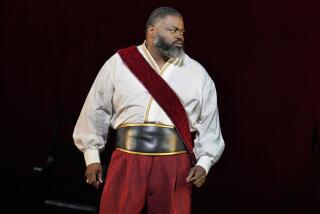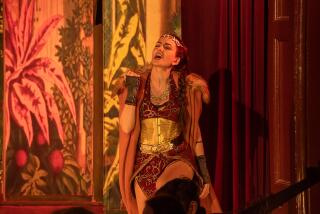Returning to the Met, Pavarotti Holds His Own
- Share via
NEW YORK — He came, he sang, he leaned on the props for support a lot.
But if Luciano Pavarotti didn’t quite conquer, he at least showed flashes of his old brilliance when he returned to the Metropolitan Opera on Monday night as the Egyptian warrior Radames in Verdi’s “Aida.”
In fact, the superstar Italian tenor, who celebrated his 65th birthday in October, grew stronger as the long evening wore on.
The role of Radames is a cruel test for any tenor, since he has to sing the demanding aria “Celeste, Aida” barely five minutes into the opera. And even in Pavarotti’s prime, the part was a bit heavy going for his essentially lyric voice.
The strain showed painfully at first, with high notes that sounded constricted and uncertain. In the big ensembles of Acts 1 and 2, he was merely going through the motions--even apparently mouthing the words in spots. And his face bore a look of distress that was more than a display of the hero’s inner conflict.
But in the Nile scene of Act 3, and especially in Act 4, he sang almost like the Pavarotti of old, with that distinctive “ping” back in his voice, some nicely floated phrases and even a ringing high note or two.
He beamed his trademark smile when he came out for his curtain call to a standing ovation. “Look,” it seemed to say, “I made it!”
Physically, despite knee and hip replacement surgery and considerable weight loss, he is unable to do much except stand in one spot and occasionally raise his arms. Even that exertion tired him, because he frequently rested against such props as a rock, an altar or a chair that seemed to have been put on stage with his infirmities in mind.
Pavarotti keeps denying rumors that he is bidding farewell to staged opera in favor of concerts. He can fill the largest auditorium with adoring fans who are happy to pay to hear his amplified voice--with or without the other two tenors--sing their favorite arias and songs.
But appearances at the world’s major opera houses are vital to maintaining artistic credibility, and Pavarotti obviously still cares about that. As an editorial notes in the current issue of Opera News, “It is a distinction to sing at the Met, which is why some performers who rarely put on a costume still will tailor their schedule to include a stop at Lincoln Center.”
Given Pavarotti’s limitations, any dramatic sparks during the evening were going to come elsewhere. And there were quite a few in the debut of American baritone Mark Delavan, who sang the small but pivotal role of Aida’s father, Amonasro, disguised leader of the Ethiopians.
Delavan, who has been singing next door at the New York City Opera to great acclaim, made a stunning impression. He has a huge, warm voice that sounds a bit like the legendary Leonard Warren, and he has intensity to spare. With the current scarcity of true Verdi baritones, Delavan should be around for a long time to come.
Both female leads were returning from last season. Soprano Deborah Voigt brought lustrous tone but only occasional fire to the title role. Mezzo Olga Borodina was again sensational as the jealous princess Amneris, her judgment scene justly bringing down the house.
The Met orchestra under James Levine brought out both the grandeur and the delicacy of Verdi’s score.
Pavarotti is singing four more performances, all long since sold out. The Saturday matinee on Jan. 27 will be broadcast live on the radio (airing in the Southland at 10:30 a.m. on KUSC-FM [91.5]).
The Met says it is talking to him about next season, but nothing has been decided. The only future opera appearances to which he has committed are in Puccini’s “Tosca” next season at London’s Covent Garden.
More to Read
The biggest entertainment stories
Get our big stories about Hollywood, film, television, music, arts, culture and more right in your inbox as soon as they publish.
You may occasionally receive promotional content from the Los Angeles Times.










